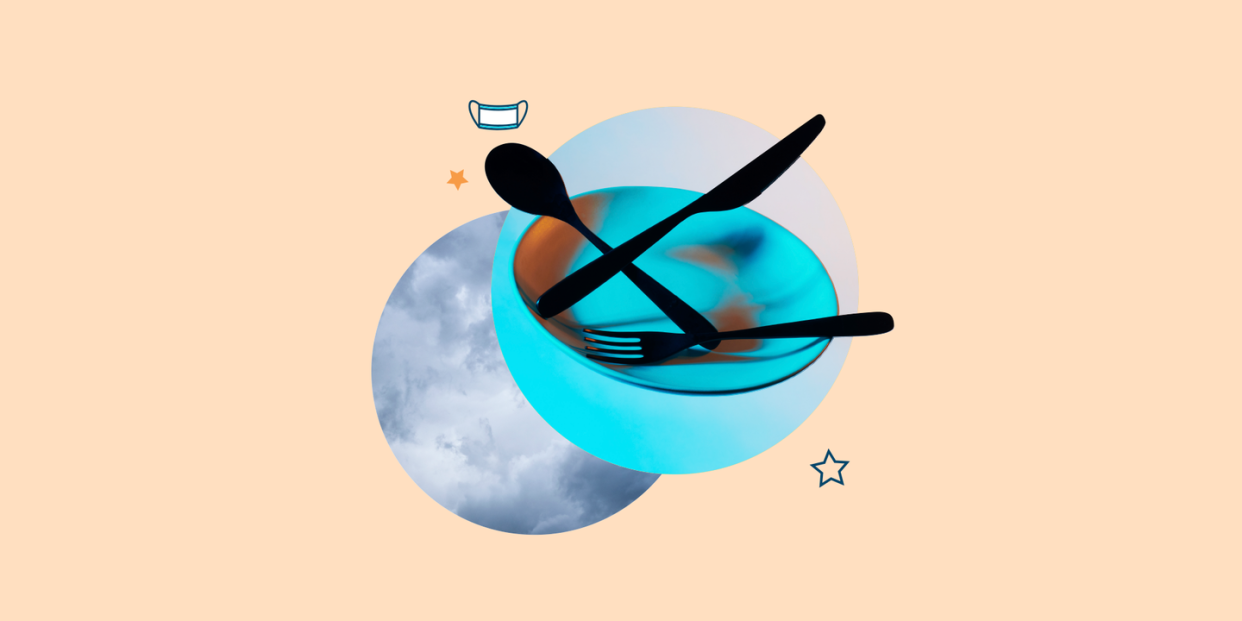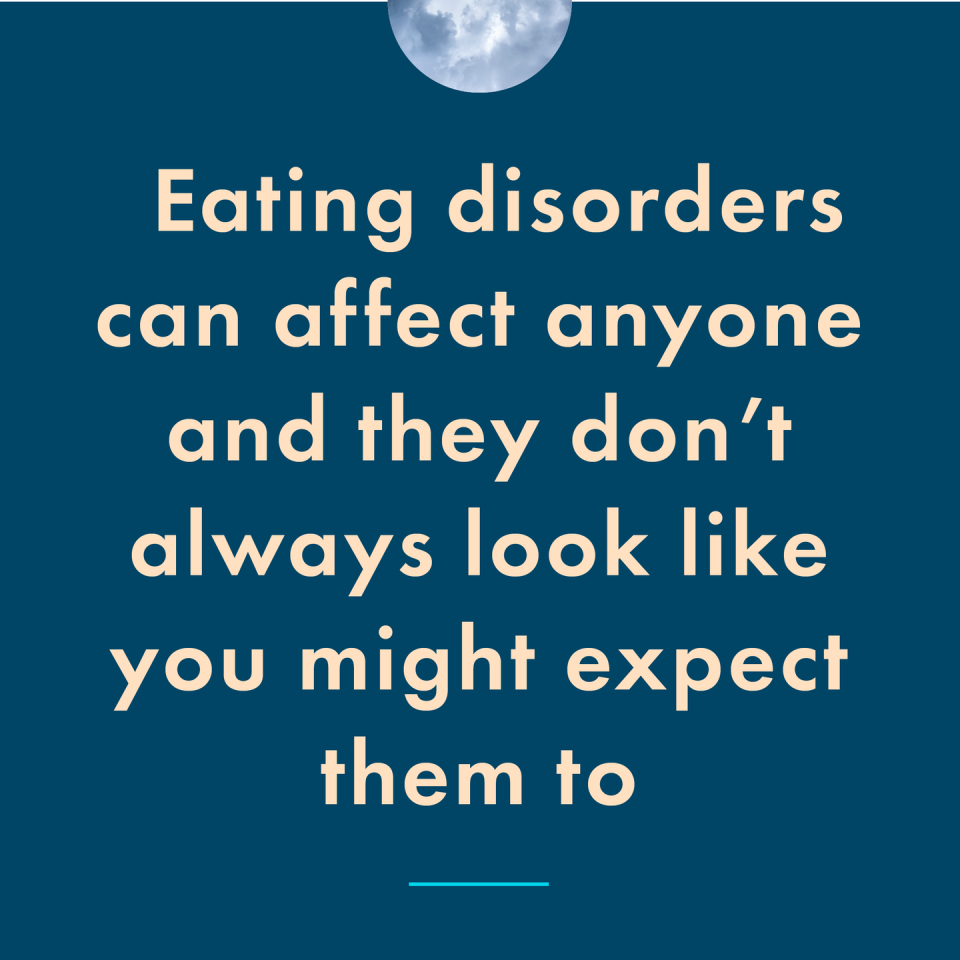How the pandemic has changed our relationship with food

Trigger warning: This article features discussion around eating disorders
Having moved out of a flat in an area that she loved in March last year, Jiana Smith, 20, found herself living alone and locked down. As chaos swirled, she began to exert control the over the only thing she felt she could - her calories. “The lockdown - and the pandemic overall - made me feel like I was losing my grip on my life, so I challenged myself to see how little I could eat,” she explains. “I tracked my calorie intake a notebook. Sometimes I was euphoric about losing weight, but more often than not I found myself anxious and mentally exhausted."
The COVID-19 lockdowns triggered a spike in mental health issues among UK adults – from high-stress levels, to insomnia, panic attacks, anxiety, low mood, and fear. For some, including Jiana, these issues manifested as eating disorders. Being unable to work or see friends meant she saw lockdown as an opportunity to “better” herself. “Unfortunately, ‘bettering myself’ translated to starving my body and an obsession with losing weight.”
Jiana is far from alone. Statistics from eating disorder charity Beat paint a worrying picture. From pre-pandemic in February 2020 to mid-lockdown number two in November, they saw an 140% increase in demand for their helpline services. As of December, they’d noted an 179% increase in social media contact.
In a year that’s seen a deadly virus isolate and alienate people to keep them safe, it’s not surprising that mental illnesses - of which eating disorders are a subcategory - are on the rise. You might even see yourself in Jiana's story. “Coping with extreme changes to routines and living situations, like we all have this year, has the potential to be incredibly triggering,” shares Jess Griffiths, Beat's clinical lead. “Eating disorders thrive on secrecy, and it’s much easier to conceal symptoms and behaviours when you’re not frequently seeing other people,” she adds.

The heightened stress of living through a pandemic led many to develop habits consistent with disordered eating. “Eating disorders (EDs) are fundamentally a coping mechanism”, explains chartered psychologist and ED specialist doctor Rachel Evans. “Lockdowns also left a hole in many people’s lives, and for some it was filled by thoughts about food, body image and exercise,” she explains. This turned out to be a terrible combination. “Clients tell me dieting and counting calories can be a distraction from everything else going on,” Evans adds.
For anyone who had a pre-existing or an underlying ED, lockdown could have been the trigger to bring the issue to the fore once more. “Eating disorders are complex mental illnesses, so lockdown wouldn't be the sole reason for someone developing one,” Griffiths explains. “However, the stress and upheaval it caused could have triggered eating disorder behaviours in those who were already unwell or vulnerable, and even in those who considered themselves to be in recovery,” she says.
That’s what happened to Molly*, 21. Despite struggling with disordered eating in the past, she says she felt ‘stable’ when first asked to stay at home in March 2020. “I coped well during the first lockdown but as restrictions eased and the world opened up again, it all caught up with me. I struggle with bulimia, and it crept back into my life, quickly getting worse,” she shares.
Molly says she thinks it got bad later in the year and not during the first lockdown because “autumn and winter felt endless. All of my university tutoring was online. I had no sense of routine, no support, and zero structure. I thought bulimia was helping me to cope, but soon, it spiralled into something that controlled me,” she says.
Spot the signs
If you’re worried you or someone you know may be suffering from disordered eating, the element of control is a key signal. It can present as an individual feeling that they have to eat the same things, number of calories, or at the same times day in, day out. Others can get stuck in a cycle of bingeing and purging. Evans has a number of clients who started a ‘health kick’ during the first lockdown, which she says then then developed into an obsessive way of controlling food and exercise and, in turn, feelings of uncertainty. “They said that at first it felt like a choice, but they then became stuck in these habits,” she explains.

Other red flags? Feeling emotional distress or guilt around or after eating certain foods believed to be ‘bad’, explains registered associate nutritionist and ED specialist Isla Robinson, as well as “cutting out food groups without medical or religious reasons, new obsessions with 'health', 'fitness' or 'wellness' at the expense of everything else,” she shares. "Watch out for small behavioural changes like irritability, poor sleep and concentration, and a reduced desire to enjoy food or meals with others," Robinson warns.
Remember, too, that eating disorders can affect anyone and they don’t always look like you might expect them to. Molly’s didn’t, but she knew that mentally, she needed help. “I’m still a perfectly normal, healthy weight,” she explains. “There's a stereotype that everyone with an eating disorder is underweight, which isn’t the case. The majority of people aren’t, but the stigma makes it harder to justify, both to yourself and others, that you need help,” she says.
Help is out there
If any of the above apply to you, know this: you’re not alone, and it's possible to make a full recovery. The key thing, all three experts stress, is getting help early. Luckily, Molly reached out to her local GP before things got really bad and six months down the line, is receiving help via a local eating disorder service and seeing an occupational therapist who specialises in eating disorder recovery. “The unfortunate reality is that waiting lists are long, so speaking to someone early is key. If you later feel you don’t need the service you’ve been referred to, that space can quickly be given to someone else,” she says.
For Jiana, admitting that her eating had become disordered and speaking about it more openly is her way of acknowledging the problem. “My recovery has been self-led,” she explains. “It’s been a process of recognising and rooting out self-destructive behaviours, but I feel good,” she says. Evans adds: “As someone who has recovered from an eating disorder, I know that it often feels like there is no one who understands what you’re going through and no hope of changing, but there are people who understand how you’re feeling and why you’re stuck in certain habits and cycles, and a full recovery is possible."
What are the most common eating disorders?
Chelsea Kronengold, of the National Eating Disorder Association (NEDA) explains the definitions and signs of common EDS.
Anorexia: One of the better known eating disorders, it’s primarily characterised by self-starvation often resulting in excessive weight loss and distorted body image. The main symptoms include eating too little, leading to drastic weight loss, a fear of gaining weight, a fixation on size, and persistent effort to stop any and all weight gain.
Bulimia: Bulimia nervosa is often characterised by a cycle of binge eating which is then counteracted or compensated for by behaviours (e.g., self-induced vomiting) aimed at preventing weight gain.
Binge Eating Disorder (BED): Although it’s actually the most common eating disorder, BED is less talked about than anorexia or bulimia. It was only recognised as its own eating disorder in 2013. If you have BED, you’ll normally eat a much larger amount of food than normal in a short window of time and find yourself trapped in a dieting and bingeing cycle.
Avoidant Restrictive Food Intake Disorder (ARFID): This refers to someone limiting the amount and types of food they consume. Normally, the individual won’t feel distress about their own body shape or size, but will instead be uninterested in eating due to sensory issues or fear of other consequences (like choking).
Orthorexia: This is a relatively new eating condition described as an unhealthy obsession with healthy (or ‘clean’) eating. Unlike the terms above, orthorexia is not a formally recognised eating disorder. Without formal diagnostic criteria, it’s difficult to understand whether it’s a stand-alone eating disorder, a type of existing eating disorders like anorexia, or a form of obsessive-compulsive disorder.
Other Specified Eating or Feeding Disorder (OFSED): This term refers to any kind of feeding or eating disorder that causes the individual distress or impairment, but does not meet the criteria for the eating disorders listed above. Examples include purging disorder or night eating syndrome.
*Name has been changed
If you’re struggling with an eating disorder - or behaviours you think might indicate an eating disorder - do get in touch with your GP or contact Beat on 0808 801 0677
You Might Also Like

